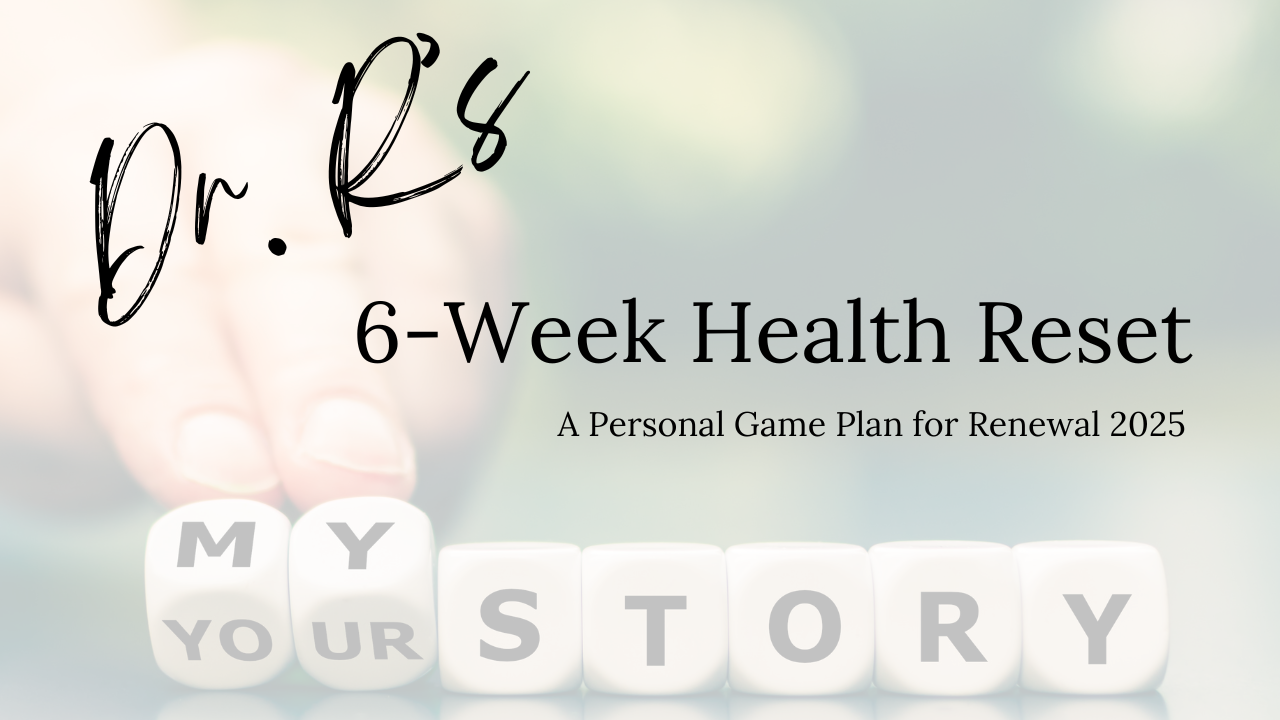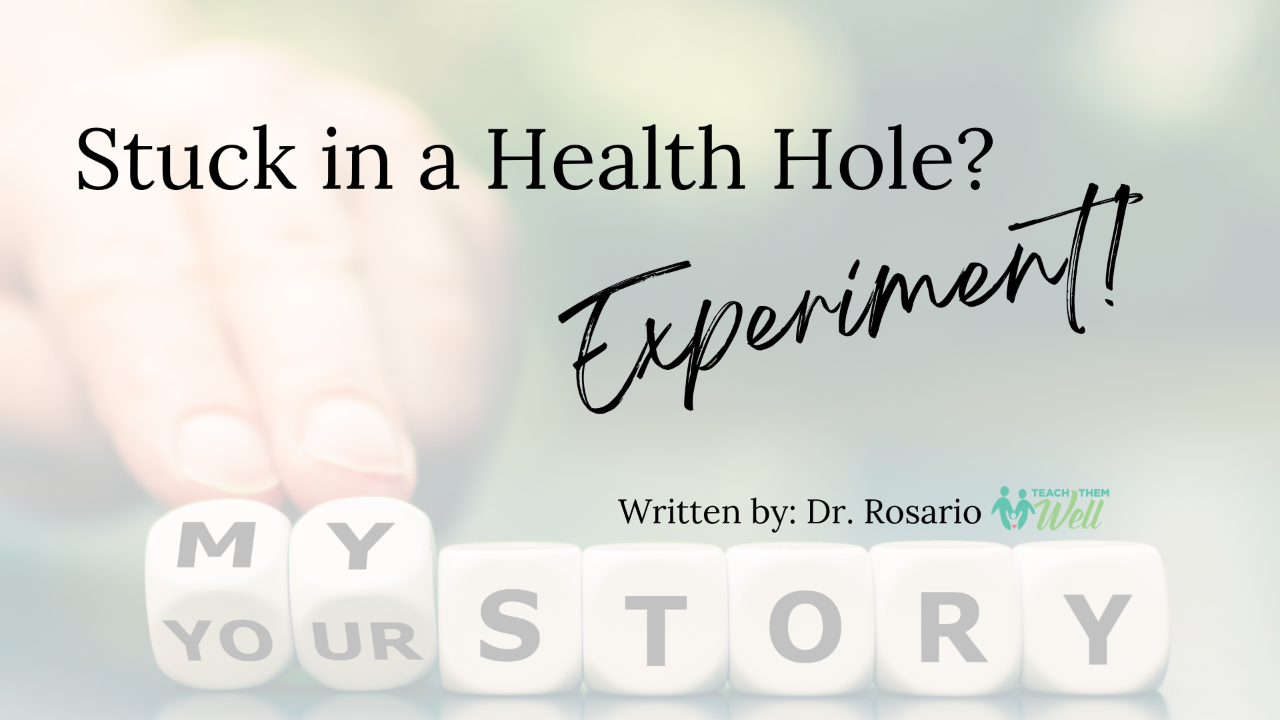My 6-Week Health Reset: A Personal Game Plan for Renewal 2025

As someone who loves a structured approach, I like to map out six-week plans for myself, my patients, and my online clients. Six weeks seems to be the sweet spot for staying motivated and making steady progress.
It is incredibly important to take time for reflection—I like to carve out time for small reflections at the end of each week, and a bigger one midway to make sure I’m on track. Life chapters change, and this method keeps things fluid, giving space for breaks and healing without feeling rushed.
This season's Renewal (my community's twice yearly 6-week health reset) is a little different. After a summer of caring for my grandmother in hospice and managing her belongings, I didn’t know if I could pull this program together in time to start & be able to finish before the holidays hit. My team has also been stretched thin, so this is a last-minute, scaled-back version, but one I’m personally super excited for.
I thought it would be kind of cool (if only to health nerds like m...
Stuck in a Health Hole? Experiment!

I often refer to this deep health hole I have been in, which I am finally making progress crawling out of.
I have thyroid autoimmunity, so I was avoiding eating food that creates imbalance and confusion in my immune system, as I have for the last 12 years. I’ve also been living in an endlessly moldy house that has been a devastatingly expensive and illness-inducing whack-a-mole situation.
I kinda got lackadaisical about finding new possibilities for why I was so sick because mold is my kryptonite, and it’s got my immune system whacked out. Makes sense. So, I kept focusing on the mold in my house and in my body. But that wasn’t working at all. I just kept getting sicker.
Because I tweak and experiment with my body every Spring and Autumn in my lymph and liver-loving program, RENEWAL, I knew my body was behaving strangely around toxins. Because, sometimes, despite a tighter diet, I would gain weight even when I would push detoxification. Strange. That feels pretty shitty, ...
Lipedema: An Illuminating Diagnosis

Zuckerberg has me nailed. He knows that I will stay on Facebook for an hour if he puts dance videos in front of me. That man is NOT my favorite billionaire, but he sure knows how to tickle my fancy. 😉 Turns out, he has an uncanny ability to diagnose disease, as well! Who knew?!
Of the 5 million dance videos he has lured me into watching, one starred this brilliant dancer that goes by Allison Jacobsss. Allison is larger-than-life in the personality department and she swings her hips around with reckless abandon when she dances. It’s so joyful. And, as someone who loves to dance myself, I was incredibly inspired by a woman who was shaped like me putting herself out into the world so bravely!
You see, Allison and me, we are fluffy in all the same ways; In all the same places. It’s not a typical fat pattern. So, when she shared that she had received the diagnosis of a common, under-recognized connective tissue/fat storage disease called Lipedema, I was intrigued! Not *just* becau...
Two New Skills That Helped Me Escape My Health Hole - Part 2

In part one of this "New Skills" series, I shared how learning more about Applied Polyvagal Theory and actively strengthening the ventral branch of my Vagus Nerve have completely reset my frayed nervous system. If you missed that post, check out my chitty-chat on the blog here.
This week, I am sharing the second tool that helped me escape my health hole.
Fascia Work!
Thank GOD for fascia work. I cannot imagine living life without this anymore. Here’s the scoop:
My body was so bad at eliminating toxins. Epically bad. I run a cleanse/body reset program called RENEWAL each year in the Spring and Fall. My diet gets super fine-tuned, and I spend 6 weeks pouring TLC into my body. No matter what I do, I never lose more than 6 pounds. I have adjusted things 500 ways till Sunday, and nothing. Nada. Zilch.
To put this in perspective, I have a lot of weight to lose - probably about 30 more pounds until I am comfortable, but I am finally on my way down. Despite having the hea...
Two New Skills That Helped Me Escape My Health Hole - Part 1

This week and next, I want to share the two tools that helped me dig my way out of a gnarly health hole when nothing else was working. These tools could be life-changing for many people in this community, including, hopefully, you!
A little back story for context
Despite being a doctor who specializes in unraveling chronic and complicated health issues, for the life of me, I could not get ahold of my current flare… for YEARS. I basically became one of my most complicated patients. Yay for learning opportunities??
I was diagnosed with my first autoimmune condition (thyroid) when I was 8 years old. My worst 3 health flares all came at the hand of mold. It’s basically my kryptonite. About 8 years ago, we unknowingly moved into an endlessly moldy house while, at the same time, I was going through my totally expected post-natal autoimmune flare after my third and final (God, please let it be final) child.
I don’t know who the frick broke the mirror, but in the last 8 year...
Functional Medicine With A Dysfunctional Doctor- An Introduction

"Functional Medicine with a Dysfunctional Doctor" is what I am calling this chapter in my life. It's a little dark humor/ inside joke with myself that keeps me laughing through the struggle.
I am a doctor who helps people with chronic, complicated health issues. Ironically, I find myself deep in a health hole, just as complex as any I have ever sleuthed and solved before in my patients. I thought it might be useful to share as I unravel my own complicated situation and reach my full potential again. Do you mind reading a little catch-up sesh? I hope not, because it's necessary. Details matter, as I always tell my patients!
On September 9th, 2005, I became a mom and a doctor the same day. No joke. My classmates were walking while I was pushing. It was a "Holy shit! I think this means I am a grown-up now!" kind of day. (If I only knew how true that was! Zero to 100, baby!)
I was also in the middle of my second massive autoimmune flare, brought on by the formaldehyde in the cadaver lab...
Fight or Flight Loop Part 2

The Fight or Flight Loop Part 2
Continuing our series on the fight-or-flight loop, I want to talk about the genetic contributors that can make you more susceptible to becoming stuck in fight-or-flight mode. You may recall from Part 1 of this series that the fight-or-flight loop can create various symptoms that seem unrelated. Being stuck in this cycle can be expressed in multiple ways. If you have not yet read Fight-or-Flight, Part 1 of this series, I strongly encourage you to pause here and read that first.
The Genetics
Most of us have heard of 23andMe and Ancestry. Some of you have maybe even had testing done through one or the other. If you have run your genetics through one of these services but aren't sure what to do with the information, separate third-party reporting sites will make the codes you receive from them understandable. These sites can let you know if you have genetic variants that can make you more susceptible to living in a fight-or-flight state.
These ser...
Fight or Flight Loop Part 1

Fight-or-Flight Loop, Part 1
Are you familiar with the term fight-or-flight? Did you know that the fight-or-flight response can become ingrained within your body, creating many problems that can be detrimental to your overall health? Let's talk about the symptoms and signs that you're stuck in the fight-or-flight loop, how you get into it, and the mayhem it can create in your life and your health.
The Fight-or-Flight Loop
Fight-or-flight is the instinctual response to resist (fight) or run from (flight) a threatening or dangerous situation. This response dates back to our ancestors and their choices when facing danger. We may no longer need to run from a sabertooth tiger, but when we constantly have too much on our plate, live a stressful life, and don't take time to rest when we need it, we can become stuck in a seemingly ever-present loop where we're constantly on alert. There is a saying that goes, "When all you know is fight-or-flight, red flags and butterflies all feel the s...
Digital Dementia

What is Digital Dementia?
What is digital demential? Digital dementia refers to a decline in cognition and in short-term memory loss from excessive use and reliance on technology. All of us are using our technology all the time to do tasks for us. These task used to be handled in your temporal lobe of our brain, which is responsible for memory, spacial awareness, auditory processing and more. Tasks like math, finding and getting to locations and memorizing things like phone numbers and important dates have all been are taken over by our phones and other electronic devices. We basically don't use that part of our brain anymore as much.
Who Does Digital Dementia Affect?
While Digital dementia affects everybody, it especially affects children and their development because while we as adults used to have to do manual math and find our way around town, children of this generation, have never really developed that part of their brain because they were born into a technological world. So t...
The Scary Truth About Insulin Resistance

The Scary Truth About Insulin Resistance
If you practically pass out after meals or find yourself feeling desperate for something sweet, you are likely increasing your risk of developing dementia or Alzheimer’s in your later years.
Post-meal sleepiness and sugar cravings are signs of insulin resistance, a condition in which blood sugar is chronically too high and aging your brain too quickly.
Look for other common signs of insulin resistance. For women this includes balding, growing more facial hair, and a deepening voice. PCOS (polycystic ovarian syndrome) is also commonly linked with insulin resistance. Men with insulin resistance may find they are growing breasts and they cry more easily. People take on characteristics of the opposite sex because insulin resistance promotes excess testosterone production in women and estrogen production in men.
The Causes
Insulin resistance depends on your diet and on your level of physical activity. If you subsist on a high-carbohydrate diet, ...

